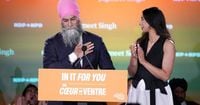Jagmeet Singh announced plans to resign as the leader of the New Democratic Party (NDP) after a devastating defeat in the April 28, 2025, federal election, where he lost his own seat in Burnaby Central. As of 9:45 p.m. on election night, Singh was trailing in third place, unable to secure more than 20 percent of the vote, and the NDP faced the grim prospect of losing its official party status in the House of Commons.
In an emotional concession speech delivered shortly after midnight on April 29, Singh expressed his disappointment not just for himself but for the party as a whole. "It’s been the honour of my life to represent the people of Burnaby Central. Tonight they chose a new member of Parliament, and I wish them well as they continue to work hard for this community," he said. Singh acknowledged the hard work of his campaign team and fellow candidates, stating, "Obviously I know this is a disappointing night for New Democrats. We had really good candidates who lost tonight. I know how hard you worked. I spent time with you, you are amazing."
The NDP entered the election with 24 MPs but was projected to leave with only seven, a staggering loss that would reduce the party to single digits in the House. As Singh spoke to his supporters, the NDP was only leading in three ridings in British Columbia: Vancouver East, where Jenny Kwan was expected to retain her seat, and Vancouver Kingsway and Courtenay-Alberni.
Singh's political career took a significant turn in 2019 when he was first elected to the House of Commons in a byelection for Burnaby South. In the 2021 election, he was re-elected with over 40 percent of the vote, significantly ahead of the Liberal candidate. However, the riding was redrawn and renamed Burnaby Central for the 2025 election, a change that proved less favorable for the NDP.
Throughout his leadership, Singh had campaigned on various policy wins, including a confidence and supply agreement with the Liberal minority government that promised the implementation of pharmacare and dental care for low-income Canadians. However, in September 2024, Singh announced the end of this agreement, citing insufficient progress on healthcare and affordability measures, yet he chose not to trigger an election.
As the election unfolded, Singh faced mounting pressure from within and outside the party. Polls indicated that the NDP's support had plummeted from 19 percent in January to around 10 percent by the time the election began on March 23. This decline was exacerbated by the perception that Singh was not a viable candidate to counter the challenges posed by U.S. President Donald Trump, whose policies and threats had become central to Canadian political discourse.
Singh's campaign pivoted to emphasize the importance of electing enough NDP MPs to hold the balance of power, a strategy that included highlighting past legislative successes achieved through cooperation with the Liberals. Despite this, Singh's message did not resonate as hoped, and he was forced to confront the reality of a significant electoral defeat.
Among the few victories for the NDP on election night were those of Alexandre Boulerice in Quebec and Leah Gazan in Winnipeg Centre. However, many of Singh's colleagues, including veteran MP Brian Masse, were projected to lose their seats. The NDP's struggles were particularly evident in regions where they had previously enjoyed support, such as Atlantic Canada, where they failed to win any seats.
In his speech, Singh emphasized the need for hope and unity, stating, "I’m hopeful for our party. I know we will always choose hope over fear and optimism over despair and unity over hate." He also congratulated Prime Minister Mark Carney on his victory, acknowledging the challenges ahead in protecting Canada’s interests against external threats.
Singh's tenure as NDP leader has been marked by both achievements and challenges. His leadership saw the introduction of significant healthcare initiatives, yet the electoral results reflect a party struggling to maintain its relevance in a rapidly changing political landscape. As he prepares to step down, Singh expressed his commitment to continue supporting the party and its values, albeit from outside the House of Commons.
Looking ahead, the NDP faces a critical juncture as it seeks to rebuild and redefine its identity in the wake of this electoral setback. With Singh's resignation, the party must now consider its future direction and leadership as it grapples with the realities of a diminished presence in Parliament.





